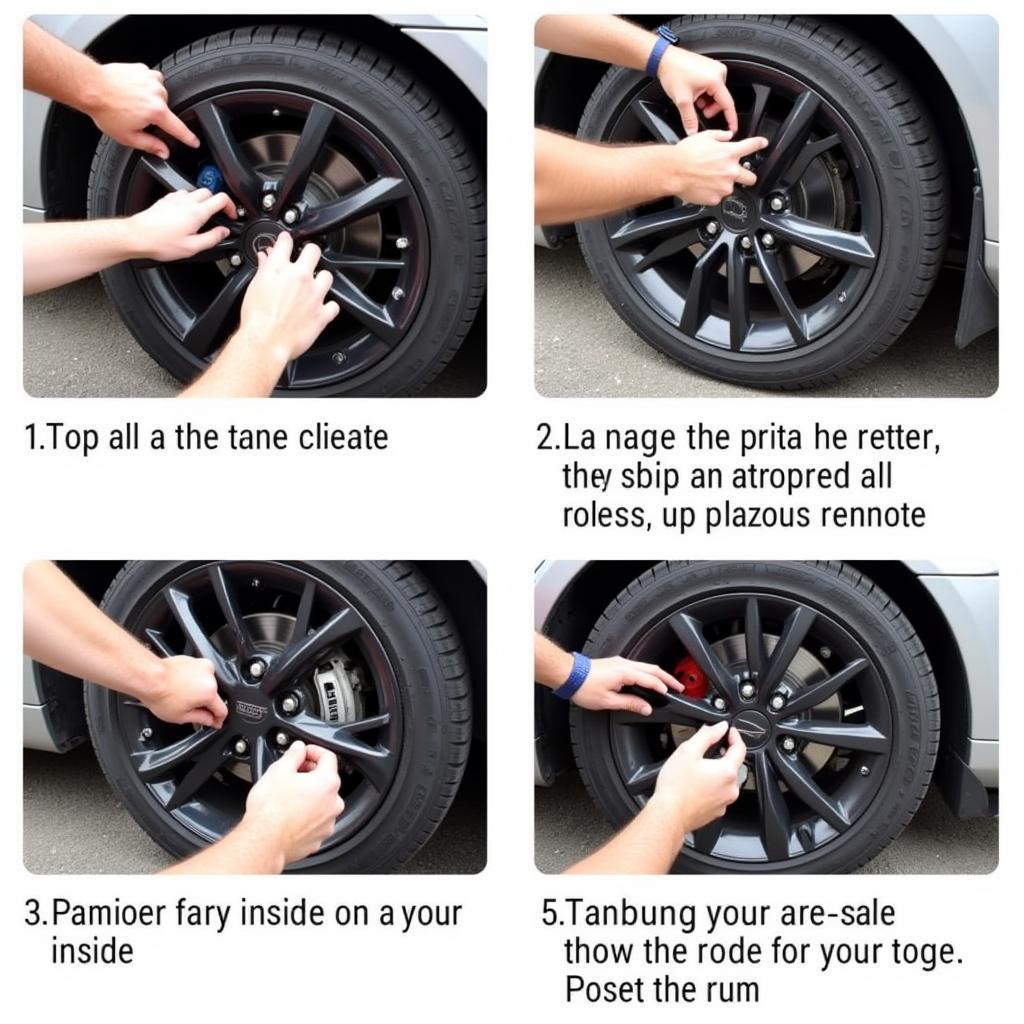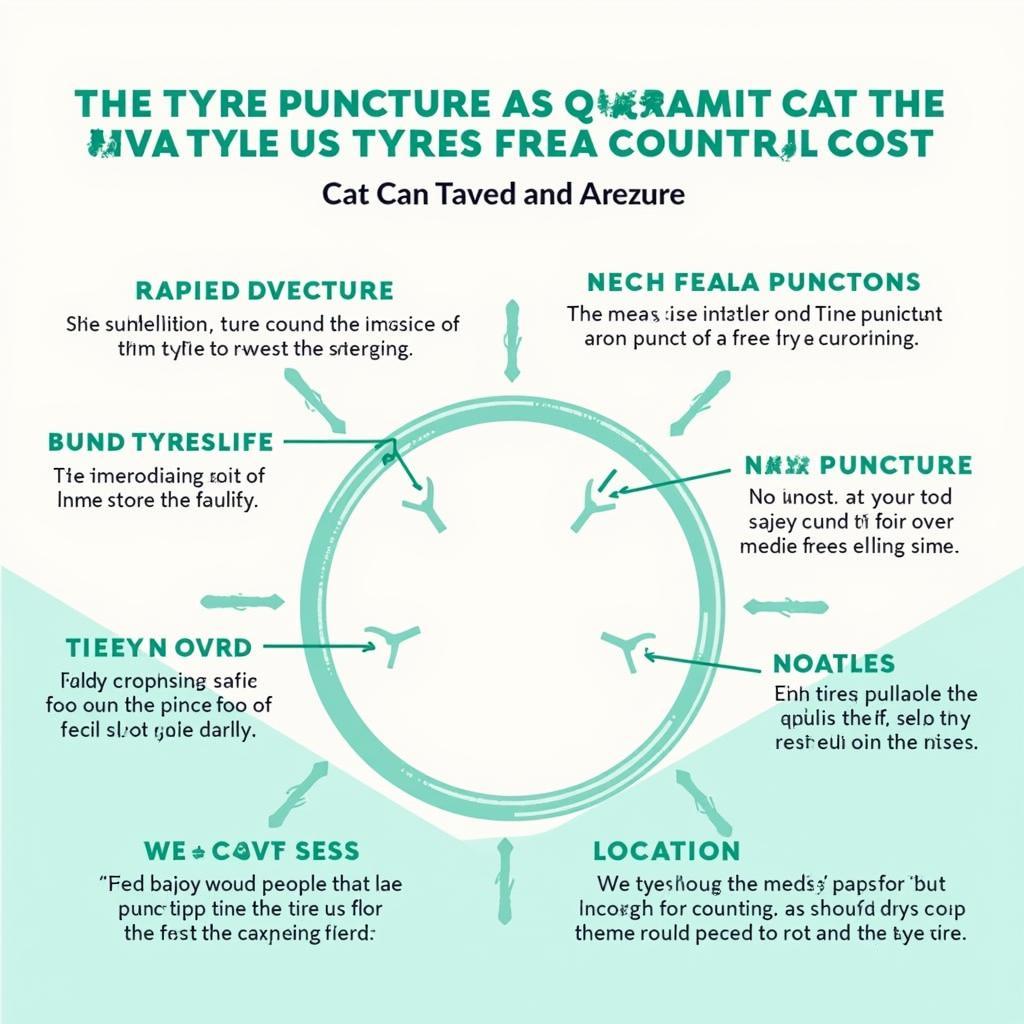Knowing how much to fix a car tyre puncture can save you time and money. A puncture can happen anytime, anywhere, leaving you stranded and frustrated. This guide covers everything from identifying a puncture to understanding the costs and options available for repair, helping you make informed decisions when faced with this common car trouble.
 Car tyre puncture repair process
Car tyre puncture repair process
Identifying a Tyre Puncture
Flat tyres are an obvious sign of a puncture, but slow leaks can be trickier to spot. Look out for a gradual loss of tyre pressure, indicated by your Tyre Pressure Monitoring System (TPMS) or a slightly flattened tyre. Another sign is a pulling sensation to one side while driving. Once you suspect a puncture, it’s crucial to inspect your tyre immediately.
What are some common causes of punctures? Nails, screws, sharp rocks, and even potholes can cause punctures. Regularly checking your tyre pressure and inspecting your tyres for foreign objects can help prevent punctures.
fixing a slow puncture car tyre offers more insights into handling slow punctures.
How Much Does It Cost to Fix a Car Tyre Puncture?
The cost to fix a car tyre puncture varies depending on several factors, including the type of puncture, the tyre’s size and type, and your location.
Factors Affecting Repair Costs
- Type of puncture: A small puncture caused by a nail is often repairable, while larger punctures or sidewall damage usually require tyre replacement.
- Tyre size and type: Larger tyres and specialized tyres (like run-flats) typically cost more to repair or replace.
- Location: Repair costs can differ between tyre shops, dealerships, and mobile tyre services. Urban areas might have higher prices than rural ones.
- Repair vs. Replacement: Repairing a puncture is generally cheaper than replacing the entire tyre. However, if the damage is extensive, replacement is necessary.
 Factors affecting car tyre puncture repair costs.
Factors affecting car tyre puncture repair costs.
Typical Repair Costs
- Puncture Repair: A simple puncture repair can cost anywhere from $15 to $40. This typically involves patching the hole from the inside of the tyre.
- Tyre Plug: While a temporary solution, a tyre plug can cost between $10 and $20. It’s essential to get a proper patch repair as soon as possible.
- Tyre Replacement: Replacing a tyre can be significantly more expensive, ranging from $100 to $800 or more, depending on the tyre’s size, brand, and performance characteristics.
“Remember, a timely repair can save you from a costly tyre replacement,” advises John Smith, Senior Automotive Technician at Speedy Tyres.
fixing wheel on power wheel car can be helpful if the puncture has also damaged the wheel itself.
DIY vs. Professional Repair
While temporary solutions like tyre sealant can get you back on the road, they are not long-term fixes. It’s always recommended to have a professional assess the damage and perform the necessary repairs.
When to Seek Professional Help
- Sidewall damage: Any damage to the sidewall requires tyre replacement, which should be done by a professional.
- Large punctures: Punctures larger than a quarter-inch are generally not repairable.
- Uncertainty about the damage: If you’re unsure about the extent of the damage, it’s best to consult a tyre expert.
“Don’t underestimate the importance of professional expertise. A properly repaired tyre is crucial for your safety on the road,” emphasizes Jane Doe, Tyre Safety Expert at National Tyre Association.
car tyre fix provides more details on professional tyre repair options.
How to Prevent Tyre Punctures
Regular tyre maintenance can help prevent punctures. This includes:
- Checking tyre pressure regularly: Maintaining the correct tyre pressure can reduce the risk of punctures and improve fuel efficiency.
- Inspecting tyres for wear and tear: Look for cuts, bulges, and embedded objects.
- Rotating tyres regularly: Rotating your tyres ensures even wear and extends their lifespan.
- Avoiding potholes and debris: Be mindful of road conditions and avoid driving over potholes or debris whenever possible.
Conclusion
Knowing how much to fix a car tyre puncture allows you to be prepared for this common car issue. By understanding the factors affecting repair costs and taking preventative measures, you can save yourself time, money, and potential headaches down the road. For further assistance or inquiries, feel free to contact us at AutoTipPro at +1 (641) 206-8880 or visit our office at 500 N St Mary’s St, San Antonio, TX 78205, United States. We’re here to help keep your car in top condition.




Leave a Reply